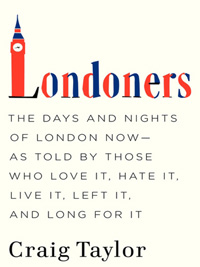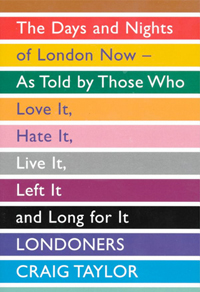 Londoners: The Days and Nights of London Now – As Told by Those Who Love It, Hate It, Live It, Left It, and Long for It
Londoners: The Days and Nights of London Now – As Told by Those Who Love It, Hate It, Live It, Left It, and Long for It
by Craig Taylor
Ecco, 2012
448 pages / $29.99 Buy from Amazon / Powells
Looking at a map of London, you see neighborhoods with familiar names such as Chelsea and Greenwich, and you see neighborhoods that sound like cheeses (Rotherhithe), erectile dysfunction pills (Vauxhall), Tolkien inventions (Isle of Dogs) and enormous breakfasts (West Ham). Maybe you’ve visited London, but for those of us who haven’t and who still harbor a deep curiosity, despite the dreary weather, bad food, soot, lootings, and long shadow of Bill Buford’s soccer hooligan book Among the Thugs, Craig Taylor’s Londoners both confirms and broadens London’s reputation as an enchanting, holy polluted kickass clusterfuck. And it does so in a way that proves as interesting as its subject.
Londoners is an oral history, a fact suggested by its old-McSweeney’s-ish subtitle: The Days and Nights of London Now – As Told By Those Who Love It, Hate It, Live It, Left It, and Long For It. Unlike a traditional narrative or expository history, an oral history is, by its nature, a “through the eyes of” point-of-view. It isn’t theoretical. It isn’t analytical. It doesn’t offer insight into its subject by editorializing or examining, or by trying to contextualize things in a bed of paraphrased or distilled information. Instead, it’s a collection of trimmed and sequenced quotations – just spoken words, the voice of the people rather than the journalist.
Those who frequently read about music will recognize the format from Legs McNeils’ canonical Please Kill Me: The Uncensored Oral History of Punk, John Cook’s Our Noise: The Story of Merge Records, and Mark Yarm’s recent Everybody Loves Our Town: An Oral History of Grunge. All use the oral history form to great effect. Taylor’s is equally engrossing. Over the course of five years, he interviewed over 200 people in London, producing some 950,000 words of transcribed interviews, before winnowing his selections down to the wriggling mass of text that fills these 400 pages. The book not only asks, “What is London?” it asks, “Who is a Londoner?” As Taylor says in the introduction, his goal was “to assemble a collage of voices that could yield a richness about a place and time.” He wanted to do so in a way that created the “narrative arc and emotional truth” and “pace and texture of a good novel.” He isn’t fooled about the project, though. “Whatever it is,” he says, “Londoners is not a definitive portrait; it’s a snapshot of London here and now.”
In Londoners’ case, the oral history format also reflects the nature of not just London, but cities in general. They’re knowable yet not entirely fathomable. They can’t be reduced to simple characterizations, because as well you can describe them physically, their essence is more elusive. As a composite of various, often conflicting impressions, an oral history might come the closest to capturing a city’s character, because the form itself is a bundle of contradictory, overlapping voices. Londoners is a case of form as function. The portrait that emerges from it is, like its subject, a pastiche, and like any community, it’s comprised of its residents’ experiences, and as Shakespeare says in the book’s epigraph, “What is the city but the people?” (It should be noted that, despite the book’s format, Taylor’s intro stands alone as a stellar first-person narrative essay on London, the nature of place, travel, home and being an outsider.)

Writing an oral history isn’t easy. Taylor and McNeil didn’t just dump a bunch of quotes onto the page and slap a cover on it. This isn’t an exercise in transcription. Transcription is only the first step. The job of a narrative historian is to write history by metabolizing existing information, paraphrasing and selecting quotations, and telling the story in his or her own words. The job of the oral historian is to shape the exact words of others into a story, by interviewing innumerable sources, then cutting, refining, editing, grouping and sequencing quotations into a tightly curated composite that forms a larger portrait. That’s a different challenge than the traditional narrative author’s job, but no less of a chore.
After conducting thousands of hours of interviews, the oral historian has to sift through the tape to cull the choicest quotes, the ones that actually say something interesting, substantive, or revealing. As most journalists know, not all sources give good quotes, and not everyone is a natural storyteller. Some people ramble. Others jump around. Some say ‘um’ too much, or ‘like,’ like, um, way too much, and double back on themselves, don’t get the point, repeat and repeat, or can’t remember enough specifics to make their comments useful. So authors edit and refine such quotes. When including a block of quoted text, oral historians also have to leave out their own comments in order to preserve the quote’s integrity, namely, the comments the interviewer made in the middle of the conversation in order to extract more information (“So what was that like?”) and to keep sources talking (“Cool, tell me more.”). And they have to cluster and order their text so that the story’s arc, or a gestalt, emerges. That’s hard work, and an art in itself.
In the end, Taylor fails to “sort out just who is, and who isn’t, a Londoner” or fully comprehend his home. This is central to the book’s success, because this limitation acknowledges the fundamental elusiveness and complexity of the world’s most interesting cities. This isn’t to say nothing is learned. Londoners is overflowing with life and detail. It’s one of those books whose pleasures derive from dipping randomly into the pages, slowly savoring what you find over months’ time. Aside from the wild anecdotes and charged language, what Londoners offers above all is an antidote to all the common, negative characterizations of the city as cold, difficult, dirty and mean. As a Transport for London Lost Property clerk says in the second chapter, despite the “bleak view of London,” “there’s a hell of a lot of good people here. It’s a testament to the honesty of Londoners and people in general who hand things in.” It’s something I think about during my regular bouts of Anglophilia, where I rewatch Fawlty Towers and eat crisps in the desperate ways armchair travelers do when they can’t afford a plane ticket.
***
Aaron Gilbreath has written essays for Tin House, Yeti, The Threepenny Review, Paris Review, and The Normal School, and writes about books sometimes for the Portland Mercury. You can find him at http://aarongilbreath.wordpress.com/
Tags: Aaron Gilbreath, Craig Taylor, Londoners

This is good.
Thanks Scott. Taylor has a short piece in the current NY Times Sunday Magazine, and a lot of the text is pulled his intro to this book, so it gives a good taste of the whole thing.
[…] at HTMLGiant, I wrote a short review of Craig Taylor’s epic oral history, Londoners, which is both a joy […]
Hey, the food’s good these days. Or rather, good food is available, in any style, at prices from reasonablish to astronomical. Come on over!
Two of my favourite area names: Freezywater and Mudchute.